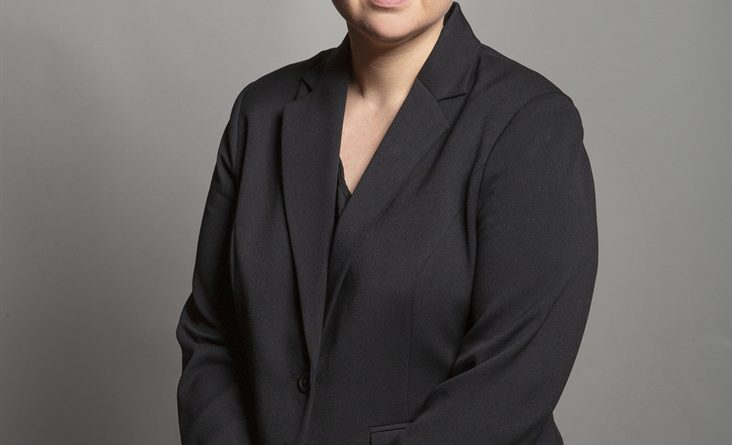Holly Mumby-Croft – 2023 Speech on Brain Tumour Research Funding
The speech made by Holly Mumby-Croft, the Conservative MP for Scunthorpe, in the House of Commons on 9 March 2023.
First, let me offer my thanks to the Backbench Business Committee for allowing time for this really important debate. I have been working on this issue for some time, alongside other members of the all-party parliamentary group on brain tumours who have produced this report. I wish to put on the record my thanks to all those who have contributed to the report and, specifically, to Brain Tumour Research for its help. May I also give a special thanks to my hon. Friend the Member for St Ives (Derek Thomas)? I greatly admire the way that he has led this process and the work that he has done on brain tumours over my time in this House, and I know that he will continue with that work.
Like many Members, I took a keen interest in this issue because of a constituent of mine, David Hopkins, who sadly was diagnosed with a brain tumour. He features in the all-party group’s report. In September 2020, David went to Scunthorpe General Hospital because he was unwell. That was right in the middle of the covid pandemic, so he was alone and had to go through the experience without his family with him. He was given the devastating news that he had a brain tumour—a glioblastoma. As we have heard today, the life expectancy of person who is diagnosed with a glioblastoma is between 12 and 18 months, so it is an utterly devastating diagnosis to receive for a family man and a very much-loved member of our community.
David underwent bouts of chemo and radiotherapy, and he sought personalised immune therapy in Germany that cost £150,000. Unfortunately, a scan in April 2021 showed further tumour progressions and he had to have two craniotomies. By the following July, David had exhausted all treatment options that the NHS could provide for him and began NeoPeptide vaccine treatment, again in Germany. Sadly, this did not save David and he died in November 2021, leaving behind his children, Dylan, Lydia and Sydney, and his wife Nicki. I should say that Nicki is a force of nature. We are incredibly proud of her in Scunthorpe. She has gone on to raise funds for Brain Tumour Research and she ran the London Marathon. I commend Nicki for the work that she has done in this area.
As I have already mentioned, people with glioblastoma may have only 12 to 18 months to live. The five-year survival rate for this cancer is still only 12%. By comparison, this rate has increased for cancers such as breast cancer and leukaemia to 85% and 54% respectively. This is not a coincidence; there has been extensive research and funding for treatment for these cancers, and we need to find treatment and cures for people such as David.
The Government have pledged £40 million to fund brain tumour research. That is neither a small nor inconsequential amount of money. It shows that there is political will to solve the issue, but will alone is not enough. Only £15 million of that pot has been spent, and that underspend must be addressed. As the report explains, there are serious shortcomings in the current funding system when it comes to accessing the funding. We simply need to get the money into the hands of doctors, researchers and the people who know what to do with it—the people who are, as we have heard, working their socks off to find a cure for this terrible disease. A further step that the Government can take in the right direction is to recognise that this is a priority and to develop a plan, backed by the pledged money, that will support research from beginning to end.
The report contains a number of key recommendations and proposals, and I will highlight a few of them. First, any treatment that is made available must be tested beforehand to assess its efficacy—we understand that—but there is a dearth of available trials, and the number of people participating in them is shockingly low. There are instances in which people with brain tumours are excluded from trials owing to concerns about the side effects from which they might suffer. Sometimes, people are just not aware that a trial is running until it is too late for them to participate.
Surveys have shown that people want to participate in trials—I think that we all instinctively understand that that is the case—and we should make it as easy as possible for them to do when clinically appropriate. Guidance must be given on the inclusion of brain tumour patients in early-phase cancer trials. More mutation-focused studies should be commissioned, and the available trials should be listed in one single source that is available to patients at their bedside, as well as to clinicians.
Secondly, another issue raised throughout the enquiry was one that researchers often encounter when taking their findings from labs into treatment centres. Conducting this translational research costs money, but researchers are impeded by a system that is difficult to navigate, meaning they cannot access money that the Government have pledged or put forward. It is ludicrous that scientists spend time and money and provide expertise on research that might go to waste because they cannot take it through the next steps. I would encourage the Government to look closely at the proposals to improve access to funding and for the MRC to introduce a fund to accelerate the pathway from discovery research to translational development.
The report provides answers on why we seem to be stuck, as it were, on brain tumour research, and why we have not made as much progress as we might have on tackling the disease. People suffering from brain tumours do not have the luxury of time, and we owe it to the people who will be diagnosed in future to take action that gives them the best possible chance of survival, so that families such as the Hopkins family in Scunthorpe do not lose the people they love.


